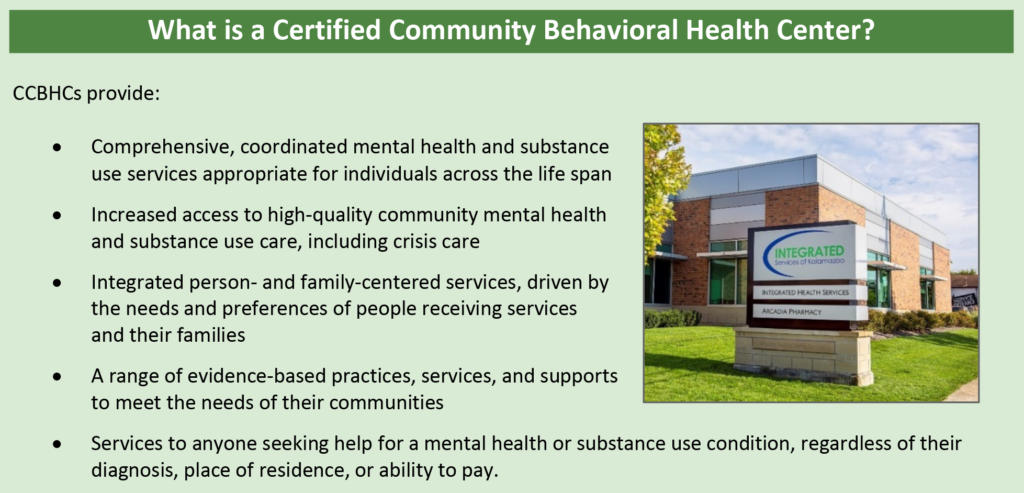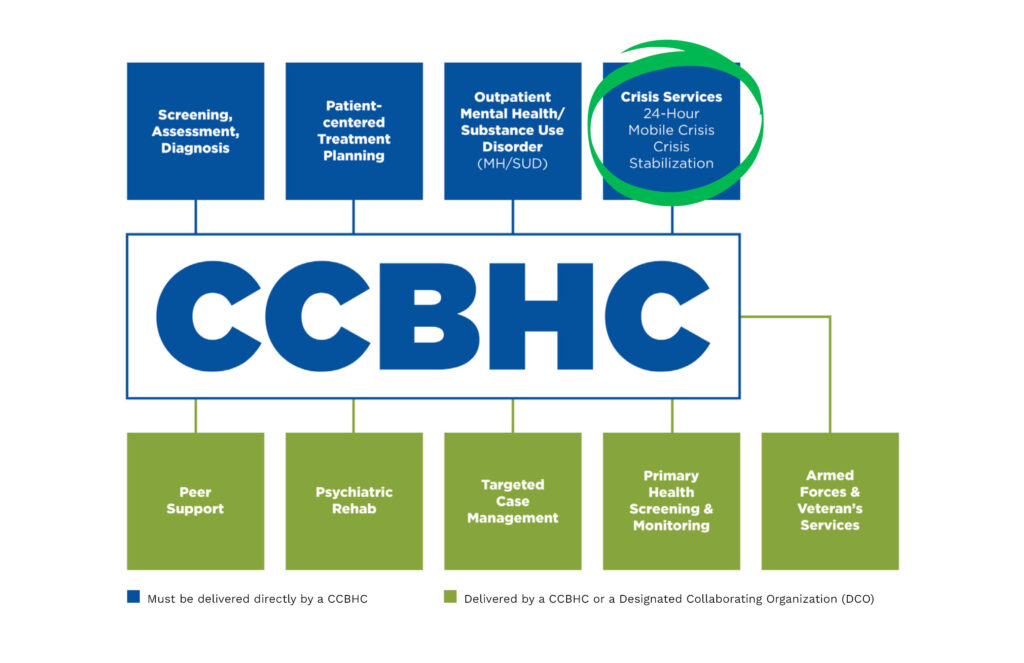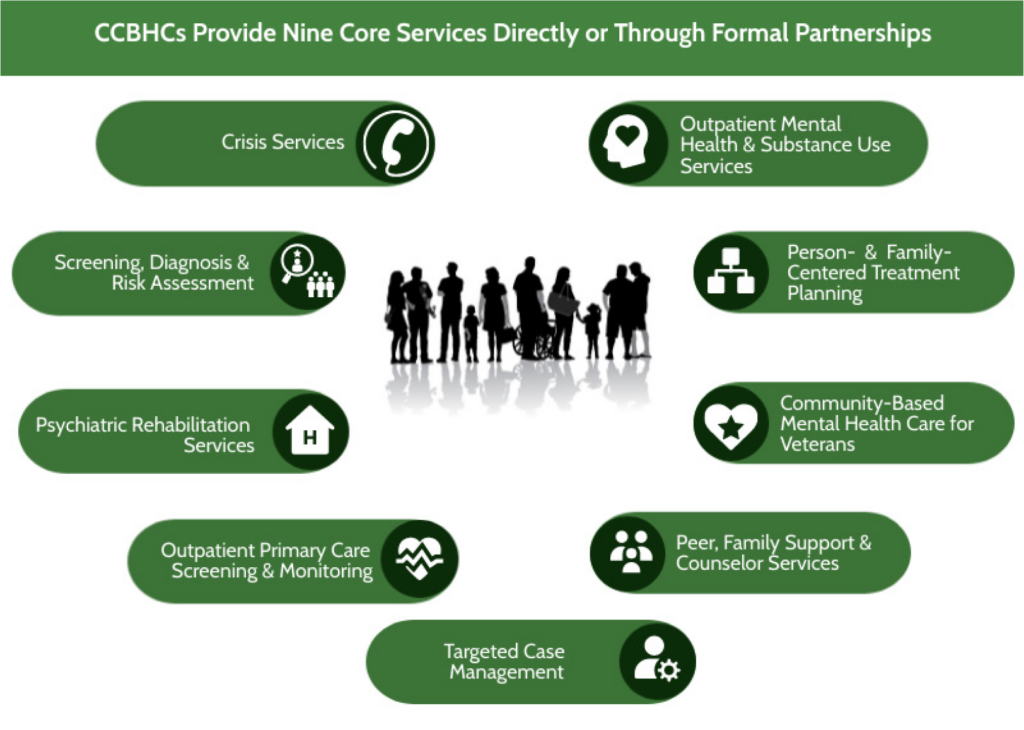A Certified Community Behavioral Health Clinic is a specially designated clinic that receives flexible funding to expand the scope of mental health and substance use services available in the community to ensure health equity and high-quality care for underserved populations. CCBHCs must meet standards for the range of services they provide, and they are required to get people into care quickly. CCBHCs must provide care coordination to help people navigate behavioral health care, physical health care, social services, and the other systems they are involved in.

The CCBHC model is designed to increase access to behavioral health services, including crisis services, that respond to local community needs, incorporate evidence-based practices, and establish care coordination to help people navigate behavioral healthcare, physical healthcare, and social services.
CCBHCs offer a comprehensive range of mental health and substance use disorder services, ensuring accessibility for all individuals seeking care, regardless of their ability to pay or place of residence. CCBHCs integrate mental health and substance use treatment with physical health care, adhere to rigorous quality and accountability standards, and work to remove barriers to treatment. Benefits also include but are not limited to reducing homelessness and decreasing diversion to hospitalization. The model also increases the availability of crisis intervention services. This initiative builds on the ADMH Alabama Crisis System of Care, which includes crisis services throughout the state that are available 24 hours a day, 7 days a week. The Alabama Crisis System of Care is a foundational component of the CCBHC model, as the state has funded six state-funded Crisis Centers, with five currently operational.
Alabama’s Transition to CCBHCs
On March 31, 2014, Congress passed the Protecting Access to Medicare Act (H.R. 4302), which included a demonstration program based on the Excellence in Mental Health Act. The legislation created criteria for “Certified Community Behavioral Health Clinics” (CCBHCs). As of March 2023, there are more than 500 CCBHCs operating in 46 states, plus Puerto Rico, Washington D.C., and Guam.
Over fiscal year 2023, Alabama’s Community Mental Health Centers and the ADMH completed assessments to determine their preparedness for the development and implementation of the CCBHC integrated behavioral healthcare business model with high-quality care, practices, and reporting measures. This model will ensure improved access to and delivery of coordinated, comprehensive behavioral healthcare to all Alabamians.
On March 16, 2023, the Substance Abuse and Mental Health Service Administration (SAMHSA) awarded the Alabama Department of Mental Health (ADMH), a Certified Community Behavioral Health Clinic (CCBHC) Planning Grant of one million dollars to develop statewide certification criteria for CCBHCs. Within the year-long period of the grant, the ADMH worked with Alabama’s Community Mental Health Centers to plan a comprehensive behavioral healthcare business model to reduce disparities; improve access to care for marginalized communities; and develop a payment system that will reward quality over volume.
On June 5, 2024, Alabama was one of ten states selected for the Certified Community Behavioral Health Clinic (CCBHC) Medicaid Demonstration Program by the U.S. Department of Health and Human Services (HHS) in partnership with the Substance Abuse and Mental Health Services Administration (SAMHSA). The CCBHC Medicaid Demonstration Program will enable states to prepare community mental health centers to expand to the CCBHC model. The Program provides the awarded states with sustainable funding to increase access to mental health and substance use treatment through Certified Behavioral Health Clinics (CCBHCs).
The CCBHC model will also improve integration, reduce silos and support a sustainable and well-trained behavioral health workforce. A transition to the Certified Community Behavioral Health Clinic business model will ensure statewide expansion of and access to mental healthcare for all Alabamians.

Shalandra Rogers, CCBHC State Project Director
334-353-4396
Required Services
CCBHCs are responsible for providing all nine services, which can be provided directly or through formal relationships with Designated Collaborating Organization (DCOs):
- Crisis Services
- Treatment Planning
- Screening, Assessment, Diagnosis & Risk Assessment
- Outpatient Mental Health & Substance Use Services
- Targeted Case Management
- Outpatient Primary Care Screening and Monitoring
- Community-Based Mental Health Care for Veterans
- Peer, Family Support & Counselor Services
- Psychiatric Rehabilitation Services
